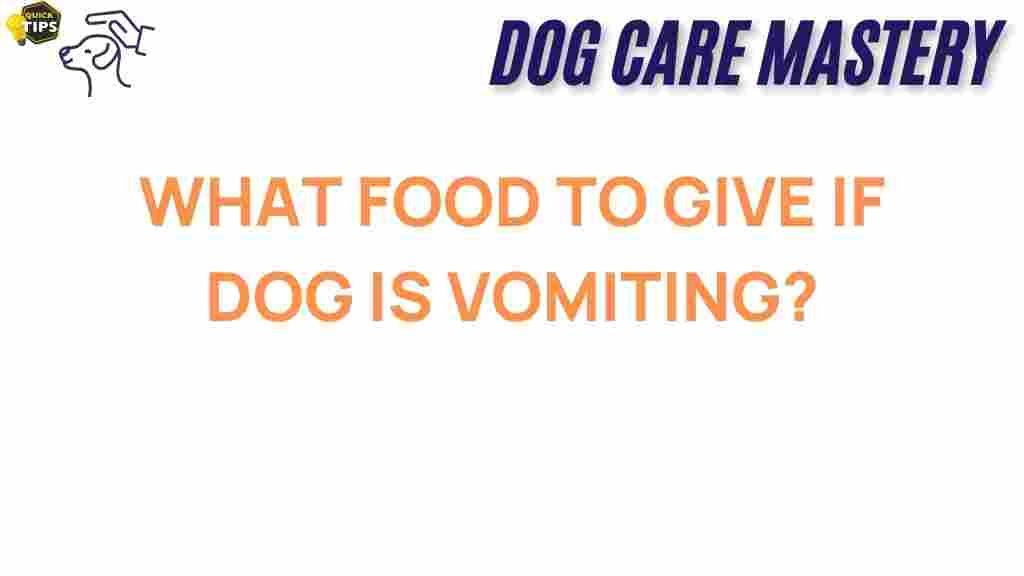Understanding Dog Vomiting and Recovery Foods
As a dog owner, witnessing your furry friend experience dog vomiting can be distressing. Vomiting in dogs can stem from various causes, including dietary indiscretion, infections, or underlying health issues. After your dog has vomited, it’s essential to provide them with the right foods to aid their recovery. This article explores what foods can help your dog recover from vomiting while ensuring their nutritional needs are met.
The Importance of Diet After Vomiting
When a dog vomits, their body loses essential nutrients and fluids. A carefully planned diet can help restore balance and support recovery. The right foods can:
- Provide hydration
- Restore energy levels
- Support gastrointestinal healing
- Prevent future digestive issues
What Foods Can Help Your Dog Recover from Vomiting?
When your dog is recovering from dog vomiting, it’s crucial to introduce easily digestible foods. Here are some recommended options:
1. Plain White Rice
Plain white rice is a staple for dogs recovering from vomiting due to its blandness. It’s easy to digest and helps bind the stool, making it an ideal choice for sensitive stomachs.
2. Boiled Chicken
Skinless, boneless boiled chicken is another excellent option. It provides protein without added fats that could irritate the stomach. Ensure that the chicken is thoroughly cooked and served without seasoning.
3. Pumpkin
Canned pumpkin (not the spiced pie filling) is high in fiber and can help regulate digestion. It can soothe the stomach and firm up loose stools.
4. Sweet Potatoes
Cooked and mashed sweet potatoes are not only nutritious but also gentle on the stomach. They provide vitamins and minerals that can aid in recovery.
5. Plain Yogurt
Plain, unsweetened yogurt contains probiotics that can help restore the natural balance of gut bacteria. This can be particularly beneficial after vomiting.
6. Bone Broth
Bone broth is hydrating and easy on the stomach. It’s also rich in nutrients that can help support your dog’s recovery.
7. Oatmeal
Cooked oatmeal is another gentle food option. It’s high in fiber and can help soothe the digestive tract.
8. Baby Food
In a pinch, plain meat baby food (without any onion or garlic) can provide a nutritious option. Always check the ingredients to ensure there are no harmful additives.
9. Commercial Diets
If your dog continues to have digestive issues, consider a vet-recommended commercial diet formulated for sensitive stomachs. These options are designed to be easy to digest and provide balanced nutrition.
Step-by-Step Process for Feeding Your Dog After Vomiting
After your dog vomits, follow these steps to ensure a smooth recovery:
Step 1: Withhold Food Temporarily
After an episode of dog vomiting, it’s usually best to withhold food for 12-24 hours. This gives their stomach time to settle.
Step 2: Reintroduce Food Slowly
After the fasting period, start with small portions of the recommended bland diet. Here’s how to do it:
- Start with 1-2 tablespoons of plain white rice or boiled chicken.
- Wait for 4-6 hours to see how your dog reacts.
- If there’s no vomiting, gradually increase the portion size.
- Continue this for 2-3 days, mixing in other gentle foods.
Step 3: Monitor Hydration
Ensure your dog stays hydrated. Offer fresh water and consider providing bone broth to encourage fluid intake.
Step 4: Gradually Transition Back to Regular Diet
Once your dog shows improvement and has not vomited for 48 hours, you can start mixing their regular food back into their diet. Do this gradually over a few days to prevent further digestive upset.
Troubleshooting Tips
If your dog continues to vomit or shows other concerning symptoms, it’s crucial to consult your veterinarian. Here are some signs that warrant a vet visit:
- Persistent vomiting (more than once or twice)
- Signs of dehydration (dry gums, lethargy)
- Blood in vomit or stool
- Abdominal pain or bloating
- Loss of appetite lasting more than 24 hours
In addition to these signs, keep an eye out for any changes in behavior or energy levels. Early intervention can often lead to better outcomes.
Conclusion
Recovering from dog vomiting can be a challenging time for both pets and their owners. By providing the right foods and monitoring your dog’s condition, you can help them return to their happy, healthy selves. Always consult your veterinarian if you have concerns about your dog’s health or if vomiting persists. Remember, a well-balanced diet is crucial not just for recovery, but for your dog’s overall well-being.
For more tips on dog health and nutrition, check out this informative guide.
Additionally, you can find resources on pet care and nutrition at the American Kennel Club website.
This article is in the category Health and created by dogcaremastery Team
